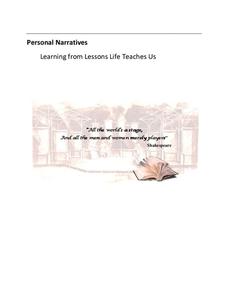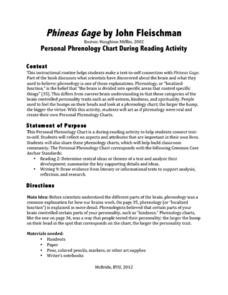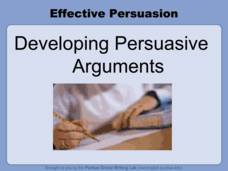Curated OER
Meet Our Teachers
Learners of all ages interview, record, and photograph teachers and staff at their school. They organize the photo with a soundbite into a PowerPoint presentation. They transcribe the interview and write a response to it.
Hawaiʻi State Department of Education
ABA Form in Music
Patterns happen everywhere, in music, math, and language! Fourth graders listen to the "William Tell Overture" visualizing the patterns that they hear. They then discuss and write an ABA poem that matches the ABA form found in the music...
Denver Art Museum
The Poetry in Non-Events
The photograph, Nellie and her Italian Soda is viewed and discussed by the class. They are instructed to use the photograph as inspiration to write a poem about non-events, or things that are beautiful in every day life. Pupils use...
Tennessee State Museum
Deciphering the Document: Unlocking the Meaning of the Emancipation Proclamation
Help your learners truly understand the Emancipation Proclamation by asking them the put it into their own words. After reading the document out loud to the class, and briefly discussing the legal language, split your class into small...
Curated OER
Listening To a Guest Speaker
Pupils review the main points of note-taking to summarize the content of a formal or informal spoken presentation. They hear a guest speaker talk about a pre-arranged topic and take notes during the presentation. Next, they write a...
Curated OER
Just Write It!
Students use a planning sheet to complete a story focusing on details, good word choice, and transition words. They share their stories with the class.
Curated OER
Researching and Writing About Another Country's Holiday: Documenting and Communicating Information
This lesson is a culminating lesson which follows students researching, collecting citations, evaluating and selecting text, graphic materials and visual aids. In this concluding lesson, 5th graders discuss the assessment task and how to...
Curated OER
Writing to Focus Reading and to Imagine Researching
Students examine several elements that would cue them into a newspaper article about community change without reading the main copy text. They discuss the details and write notes about the article. They first skim and then thoroughly...
Curated OER
Using Children's Literature to Teach Writing: Oh, Tucker!
Students are read the book "Oh, Tucker". They write a paper about the positive and negative aspects of having a dog as a pet. They use a graphic organizer to organize their thoughts and they edit them the next day in class.
Curated OER
Why Thank You!
Fifth graders listen to a read aloud of Patricia Polacco's, Thank You, Mr. Falker! students examine the use of voice in the book, discuss the writing and theme ideas. They write a thank you not to their hero.
Curated OER
All Aboard! All Aboard! The Essay Train
Third graders enjoy a train ride with The Little Engine That Could and discover how to create a five-paragraph essay train. This clever activity has students use each boxcar of the train as a template for a paragraph.
Curated OER
Cesar Chavez Biopoem
Students demonstrate their learning about Cesar Chavez and the United Farm Workers Union by writing a biopoem. They word process the poem.
Curated OER
Every Dog Has Its Day
Middle schoolers explore the use of imagery in writing. In this writing lesson, students create a writing piece that features sensory images without resorting to the use of clichés.
Curated OER
Pre-writing activities for improving students' connections to literature
Students, while reading a novel together in class, jot in their journals any connections to their own lives they can make between the text and self, text to text or text to the world. Various themes are connected to open more doors to...
Curated OER
Create a Video Poem
Collaborate to create a visual version of a poem using video. Before class, choose a poem to pick apart. Read it aloud and then analyze it in detail as a class. Assign a line or short section to each student to expand upon using a...
Curated OER
Choosing Where to Act
Students work together to reach a consensus about an issue. They examine a list of organizations and determine which ones meet a given set of criteria. They write supporting sentences for main ideas to end the lesson.
Curated OER
Domain and Range 2
How do you identify the domain and range of the function? As learners find out it's as easy as creating a graph. They'll identify the domain and range of a relation from its graph, write symbolic expressions describing the relationship...
Thoughtful Education Press
Personal Narratives: Learning from Lessons Life Teaches Us
"First Appearance," Mark Twain's tale about overcoming stage fright, serves as a model of a personal narrative and gets young writers thinking about milestones in their own lives. After examining student models and considering the...
Curated OER
Phineas Gage: Personal Phrenology Chart During Reading Activity
Phrenology, the belief that parts of your brain control certain aspects of your personality, is described in Phineas Gage: A Gruesome but True Story About Brain Science. While we now know much more about the brain, learners use this...
Curated OER
Effective Persuasion: Developing Persuasive Arguments
Use research to strengthen a persuasive argument. Examples of ethos, logs, and pathos are presented, and learners discuss how using research can improve one's argument. Pair this presentation with an example persuasive piece to point out...
Curated OER
On World Poetry Day, We're All Poets
Put away the books and the printouts, and break out the paper and pens to honor World Poetry Day.
Curated OER
Lesson Ideas for Comparing and Contrasting Content
Here are three lesson ideas to help students learn how to compare and contrast information in any content area
Curated OER
Empirical Formula
Plenty of time was invested in creating this detailed presentation. The first slide alone includes several steps that support your explanation of percent composition, a precursor to understanding how to write empirical and molecular...
Curated OER
Keeping Students Engaged
Here are some basic tips to keep your students focused and motivated.

























